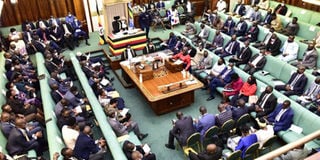Does a Ugandan MP still value the electorate?

What you need to know:
- As it might seem devastating but bewilderingly true, it has come to our exposure, as elites, that the lifestyle of a Ugandan MP is basically inflicted on their betterment and not that of the ‘wananchi’ for having shockingly failed to ably legislate on the extravagant government expenditure towards these MPs, which has in the long-run affected the economic survival of other civil servants, comparatively.
Recently, I was perusing some WhatsApp chats on a certain political forum and I stumbled on a video clip shared by an elderly friend of I from Facebook App which I haven’t had on my gadget for quite some time, but was influenced to reinstall it so I don’t miss out on what this intelligent, informed and outspoken gentleman, Mr Epiyu, often shares.
Past doing so, I met Patrick Loch Otieno (PLO) Lumumba, a renowned Kenyan lawyer and activist, enlightening the masses about two evil scenarios that are scorchingly rampant and unforgiving around Africa’s leadership tenacity: “Kakistocracy” and “Kleptocracy”.
According to Lumumba, most politicians in Africa are characterised by such weevils, to the astounding extent of pushing us to task God as a lottery or a casino attendant by praying for what we can work for, let’s say: why not bluntly shun leaders whose ideologies don’t encompass development, equality and prosperity for all? Dear keen voter, shall we, accordingly?
With Uganda’s current government system, that seems to be hinged majorly on parliamentary rulings and influenced by the executive in question, one still gets confused if the Members of Parliament are still of fair consideration in regard to the electorates’ wellbeing, or rather are exercising the “kleptocracy” of selfishly enriching themselves with taxpayers’ money, a case that is supposed to be chanted wrong, enormously; other than resort to praising all is well over impunity, intolerance, embezzlement and greed — only to wait for 2026, to hoodwink the voters to second them back to Parliament, huh.
As it might seem devastating but bewilderingly true, it has come to our exposure, as elites, that the lifestyle of a Ugandan MP is basically inflicted on their betterment and not that of the ‘wananchi’ for having shockingly failed to ably legislate on the extravagant government expenditure towards these MPs, which has in the long-run affected the economic survival of other civil servants, comparatively.
Most civil servants like teachers, doctors, nurses, to mention but just a few have overtime been witnessed holding demonstrations regarding poor wages; and the Ugandan MP who is meant to legislate against such is reluctantly enjoying life at an exorbitant pay that’s neither delayed nor denied; like it happens at the profound service of other civil servants in relation. This status quo has surely pampered most of these MPs to let go of generosity and are now shamelessly comfortable with what the government spends on them, lavishly.
According to Daily Monitor’s recent story: Parliament spends Shs2.6 billion everyday. This would go for Shs78 billion per month spent on MPs and other related activities; and one needs to inquisitively question what’s substantially left to be allocated for enhancement of other related institutions like schools and hospitals grappling with inadequacy.
As I wrap-up, I am reminiscing on how the taxpayers’ money would benefit the rest of the citizens in general. Or rather, it’s the MPs first and the rest is history?
Bunnet Ayorekire, Freelance journalist




